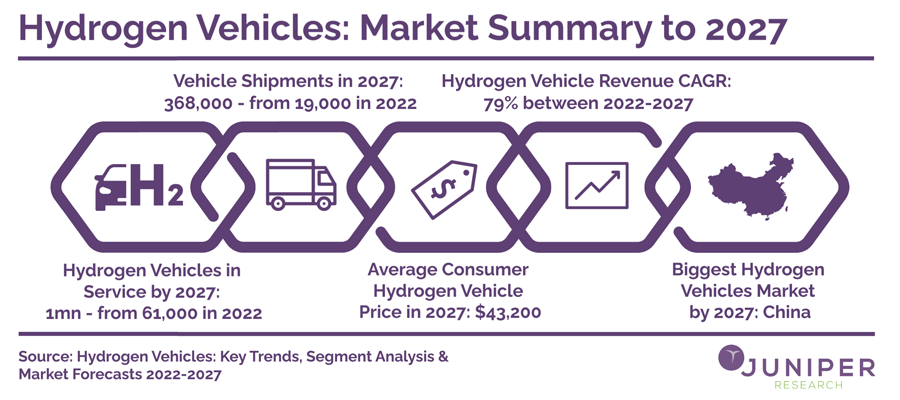🕒 Article read time: 2 minutes
Are hydrogen vehicles a promising alternative to EVs?
Sponsored content

Nick Maynard, Head of Research, Juniper Research
A recent study on hydrogen vehicles by Juniper Research found that the number of hydrogen vehicles in service globally will exceed 1 million in 2027, from just over 60,000 in 2022 – a substantial growth of over 1,500%.
The report identified that as hydrogen production and infrastructure investments increase, hydrogen-fuelled vehicles will become a more sustainable alternative to EVs (electric vehicles). EVs have many limitations compared to ICE (Internal Combustion Engine) vehicles (such as petrol- and diesel-powered vehicles), including ease of refuelling, limited range and high cost.
LIMITATIONS OF GOING ELECTRIC
The potential limitations of EVs are highlighted by the lack of penetration within commercial applications, including buses, light-duty vehicles and heavy-goods vehicles. Within these applications, hybrid vehicles of different types predominate, with range and battery limitations causing slow adoption.
In contrast, our recent research found that the potential for enhanced range and rapid refuelling compares favourably with EVs; reducing anxieties around adopting alternative fuels. Additionally, hydrogen can reduce the amount of rare earth metals needed compared to EV production, such as cobalt, nickel, and lithium.
As much as hydrogen requires platinum in the production process, it is needed only in production centres and in minimum quantities. Research on finding an alternative to platinum is also at an advanced stage. The rare metals used in EVs are required for every EV battery using present battery technologies. The advantages hydrogen vehicles have over EVs include:
• hydrogen can be pumped using the existing network of petrol stations once refitted;
• hydrogen vehicles can achieve longer distances because they more densely pack their energy storage;
• Filling up a hydrogen vehicle takes a few minutes compared to EVs, which can take many hours depending on the energy source used.
These positives have led to significant investment by car manufacturers in hydrogen vehicle development, including BMW, Hyundai, and Toyota, and commercial vehicle manufacturers, meaning that the development of new vehicle models and attempts at selling these to both businesses and consumers is inevitable.
LIMITATIONS OF HYDROGEN VEHICLES
However, the market is not without its limitations. The hydrogen vehicles market report by Juniper Research identified the low availability of fuelling infrastructure as a key challenge for wider adoption of hydrogen vehicles. Outside of California, US, which in many ways is the hydrogen capital of the world, hydrogen at fuelling stations is incredibly uncommon, and it will cost significant money to correct this, with current fuelling stations needing refitting.
Additionally, the technological landscape within hydrogen vehicles is not entirely mature, for either the vehicles themselves or the hydrogen producing technology. The vehicles themselves require further development, particularly in the commercial sector, and the technology for producing hydrogen fuel needs investment in order to meet the massive scale that will be needed.
So, how does the market move past these limitations?
The market is developing all the time, with automakers investing heavily to mature the technology. Heavy industry investment is also critical to reducing issues over the next five years. In order to best take advantage of the current concerns around environmental issues, the report by Juniper Research recommended that infrastructure vendors provide ‘green’ hydrogen, produced using renewable energy sources, to help commercial businesses decarbonise their fleets.
THE FUTURE OF HYDROGEN VEHICLES
The future of hydrogen vehicles is largely positive, as despite significant limitations at present, the technology represents an increasingly viable alternative to both EVs and ICE-powered vehicles.
The ability to re-use some existing ICE technology in hydrogen vehicles is a major positive factor for manufacturers, as they will not lose all their historical spend on this technology. This means that whilst consumer adoption has not yet happened at scale, manufacturers will continue to invest. Support from regulators and legislators will be highly important to expanding hydrogen vehicle use outside of California, with many countries looking for ways to decarbonise their economies. The EU for example has several hydrogen regulatory initiatives in the making, and we expect other bodies to follow suit.
Ultimately in commercial applications, while currently limited, hydrogen vehicle penetration will grow over time, given hydrogen’s fundamental suitability to the role in terms of improved range and better meeting vehicle power requirements. Logistics businesses and other companies with large commercial fleets should actively consider their hydrogen strategies for the future, as the market accelerates, or they run the risk of not decarbonising effectively.
Find out more about our Hydrogen Vehicles market report: https://www.juniperresearch.com/researchstore/key-vertical-markets/hydrogen-vehicles
Juniper Research provides research and analytical services to the global hi-tech communications sector; providing consultancy, analyst reports, and industry commentary. Please visit our website via the link below to find out more.
*https://www.juniperresearch.com
Published On: 21/07/2022 16:00:12

Comments Section
If you are a Logistics UK member login to add comments.